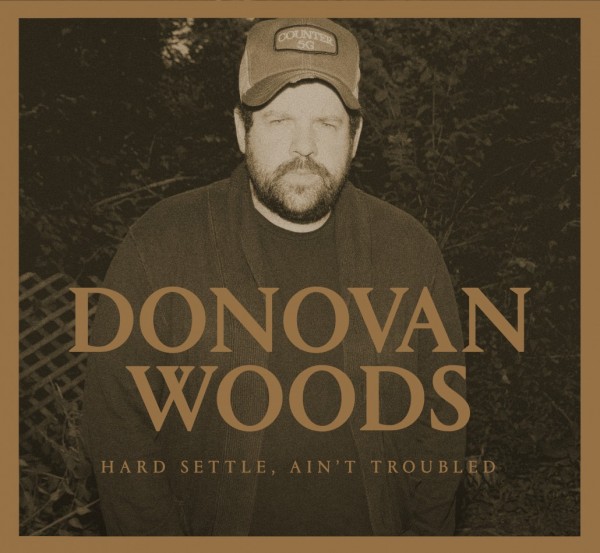Donovan Woods really likes the word “duality.” He uses it often during a brief phone conversation, describing songs from his new album, Hard Settle, Ain’t Troubled, available today. The “duality” of this, he offers, or the “duality” of that. Truthfully, the word could be applied to every track on the album, which effortlessly layers emotions and melodies like heavy oil paints on a canvas – or, if we’re really committing, “duality” could even apply to Woods as an artist. Ontario-born Woods is one of Nashville’s most recent adoptees – his Abe Stoklasa co-write, “Portland, Maine,” was cut by Tim McGraw in 2014, and since then he’s collected a handful of other notable cuts, including “Sweet Love” on Billy Currington’s Summer Forever and “Leaving Nashville” on Charles Kelley’s The Driver (more on this later).
Hard Settle, Ain’t Troubled is his fourth LP – he’s been making music since 2007’s The Hold Up – and it’s arguably his most Nashvillian. Could this be a result of his recently-solidified ties to Music City? “Probably,” he muses. “But it’s also a bit of a function of having a bigger budget. This is the way I’ve always wanted my record to sound.” Woods’ first three records featured Woods on vocal, Woods on guitar, Woods on mostly everything. This time, the picture looks very different. The album boasts more co-writers (Gordie Sampson, Tom Douglas, and Abe Stoklasa, to name a few) and plenty of pedal steel guitar – both indirect signs of Woods’ increased confidence and growth as an artist.
As he’s gotten older and more confident in his work, he says, he’s become more comfortable trusting other artists to contribute to his records. “I got all the players that I wanted,” he says of the writing and recording process for Hard Settle. “I’ve learned the best albums are not always made by one person.”
Woods’ songs often celebrate opposing feelings or sounds – Hard Settle is a collection of juxtapositions, both lyrically and sonically, where hard-hitting lyrics are often concealed by gentle fingerpicking guitar or soft piano. The album’s lead single, “On the Nights You Stay Home,” combines the evil inescapability of social media-induced “modern jealousy” with a danceable beat and instrumentation.
It’s followed by “The First Time,” a standout track in which Woods challenges nostalgia and analyzes human tendency to place memories on pedestals – the “duality,” he offers, of celebrating a memory’s greatness but recognizing the futility of any attempts to achieve the feeling again. (Consider these lyrics: “I can’t say I remember it / But it’s gotten so good in our minds / We’ll never get as high as the first time.”) “It’s the idea that you’re never going to get back to it, because your memory of it is invented anyway, and it’s an idealized version of yourself,” he says. “There may not be anything good to get back to.”
Other standouts include “We Never Met,” a lilting breakup saga that covers up sadness and bitterness with feigned coolness and nonchalance (“I ain’t lonely cause I don’t miss you / Cause there ain’t no one to miss”), and “They Don’t Make Anything in that Town,” a haunting nod to empty towns, painful tragedies, and leaving home. “May 21, 2012” artfully depicts time Woods’ spent in England, and the title comes straight from the date of a voicemail. The lyrics speak to Woods’ honest storytelling: “Now you know how literal my songs are.”
Perhaps the most carefully crafted – and potentially controversial – song on the album is “Leaving Nashville,” which was also cut by Charles Kelley on his first solo album, The Driver. Woods sings: “One day you’re the king and the next you’re not / It’s handshakes and whiskey shots / And throwing up in parking lots all by yourself.” He wrote the tune with Abe Stoklasa, a fellow Nashville up-and-comer who also co-wrote Kelley’s Grammy-nominated single, “The Driver,” featuring Dierks Bentley and Eric Paslay.
Woods’ take on his Music City exposé? “I really love Nashville, and I love America, because it has these places like Nashville that have notorious reputations but still have so much opportunity,” Woods says. With this song, he wanted to find the best way to represent the feeling of the city.
He brought the idea to Stoklasa, who required considerable convincing – Woods says it took longer to persuade Stoklasa (“hours”) than it did to actually write the song (40 minutes). “We both love Nashville so much, and we wanted to represent that dogged determination,” he describes. They barely considered that it would be cut by another artist, because they knew it was good. Woods immediately claimed it for his record, and then Stoklasa showed it to Kelley during a separate writing session – it didn’t surprise either writer when Kelley put it on hold. The track is both hopeful and depressing, celebratory and critical. Woods delivers a lighter version compared to Kelley’s powerful rendition, but the lyrics shine all the same.
Bottom line: Hard Settle, Ain’t Troubled isn’t shy about its Nashville influences, but while Woods has grown up and expanded his palette, he remains true to his artistic identity. His lyrics steal the show as always, but the record makes an overall impression that’s decidedly more positive than his previous work. It’s confident, artful, and the songs are catchy, sad, and just plain good.
Key lyrics:
- “We spent a week in your apartment one night” – Do I Know Your Name?
- “I could love you / Or better yet, I could leave you alone” – May 21, 2012
- “I could walk out on the water / But I know you’d just roll your eyes” – The First Time
Donovan’s Must-Listens:
- What Kind of Love is That
- On the Nights You Stay Home
- They Don’t Make Anything In That Town
- Between Cities
The Shotgun Seat Must-Listens:
- We Never Met
- May 21, 2012
- They Don’t Make Anything in That Town
- Leaving Nashville

